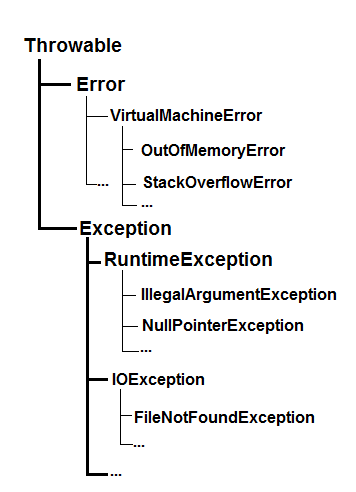- Details
- Written by Nam Ha Minh
- Last Updated on 10 February 2025 | Print Email
In the article
Java exception API hierarchy - Error, Exception and RuntimeException, you understand that
Throwable is the supertype of all errors and exceptions in Java. Now we are going to understand what are checked exceptions and unchecked exceptions, and the differences between them.Let’s review the exception API hierarchy:

1. What are Checked exceptions?
The exceptions that are subtypes of
Exception (exclude subtypes of
RuntimeException) are categorized as
checked exceptions. When we use code that can throw checked exceptions, we must handle them, otherwise the compiler will complain.For example, the following method can throw a checked exception of type
IOException:
public void createFile(String path, String text) throws IOException {
FileWriter writer = new FileWriter(path, true);
writer.write(text);
writer.close();
}Then the caller code must handle this exception:
String filePath = "hello.txt";
String text = "Hello World";
try {
createFile(filePath, text);
} catch (IOException ex) {
System.err.println("Error creating file: " + ex);
}See common checked exceptions in the section 3 below.
2. What are Unchecked exceptions?
In contrast, we don’t have to catch
unchecked exceptions which are subtypes of
Error and
RuntimeException. Methods also don’t have to declare to throw unchecked exceptions. It’s because programs typically cannot be recovered from unchecked exceptions.Note that unchecked exceptions are subtypes of
RuntimeException, although it is a subtype of
Exception.For example, the following method does not have to declare to throw
IllegalArgumentException which is an unchecked exception:
public static void setAge(int age) {
if (age < 1 || age > 99) {
throw new IllegalArgumentException("Invalid age");
}
int newAge = age;
}Let’s see another example:
List<String> list = new ArrayList<>();
String item = list.get(3);
The
get() method of the
ArrayList class can throw
IndexOutOfBoundsException but the code doesn’t have to catch because it is an unchecked exception.See common unchecked exceptions in the section 4 below.
3. List of Common Checked Exceptions in Java
Common checked exceptions defined in the
java.lang package:
- ReflectiveOperationException
- ClassNotFoundException
- InstantiationException
- IllegalAccessException
- InvocationTargetException
- NoSuchFieldException
- NoSuchMethodException
- CloneNotSupportedException
- InterruptedException
Common checked exceptions defined in the
java.io package:
- EOFException
- FileNotFoundException
- InterruptedIOException
- UnsupportedEncodingException
- UTFDataFormatException
- ObjectStreamException
- InvalidClassException
- InvalidObjectException
- NotSerializableException
- StreamCorruptedException
- WriteAbortedException
Common checked exceptions defined in the
java.net package (almost are subtypes of
IOException):
- BindException
- ConnectException
- HttpRetryException
- MalformedURLException
- ProtocolException
- UnknownHostException
- UnknownServiceException
Common checked exceptions defined in the
java.sql package:
- BatchUpdateException
- SQLClientInfoException
- SQLNonTransientException
- SQLDataException
- SQLFeatureNotSupportedException
- SQLIntegrityConstraintViolationException
- SQLSyntaxErrorException
- SQLTimeoutException
- SQLTransactionRollbackException
- SQLTransientConnectionException
- SQLRecoverableException
- SQLWarning
4. List of Common Unchecked Exceptions in Java
Common unchecked exceptions in the
java.lang package:
- ArithmeticException
- IndexOutOfBoundsException
- ArrayIndexOutOfBoundsException
- StringIndexOutOfBoundsException
- ArrayStoreException
- ClassCastException
- EnumConstantNotPresentException
- IllegalArgumentException
- IllegalThreadStateException
- NumberFormatException
- IllegalMonitorStateException
- IllegalStateException
- NegativeArraySizeException
- NullPointerException
- SecurityException
- TypeNotPresentException
- UnsupportedOperationException
Common unchecked exceptions in the
java.util package:
- ConcurrentModificationException
- EmptyStackException
- NoSuchElementException
Other Java Exception Handling Tutorials: About the Author:
 Nam Ha Minh
Nam Ha Minh is certified Java programmer (SCJP and SCWCD). He began programming with Java back in the days of Java 1.4 and has been passionate about it ever since. You can connect with him on
Facebook and watch
his Java videos on YouTube.

 Nam Ha Minh is certified Java programmer (SCJP and SCWCD). He began programming with Java back in the days of Java 1.4 and has been passionate about it ever since. You can connect with him on Facebook and watch his Java videos on YouTube.
Nam Ha Minh is certified Java programmer (SCJP and SCWCD). He began programming with Java back in the days of Java 1.4 and has been passionate about it ever since. You can connect with him on Facebook and watch his Java videos on YouTube.